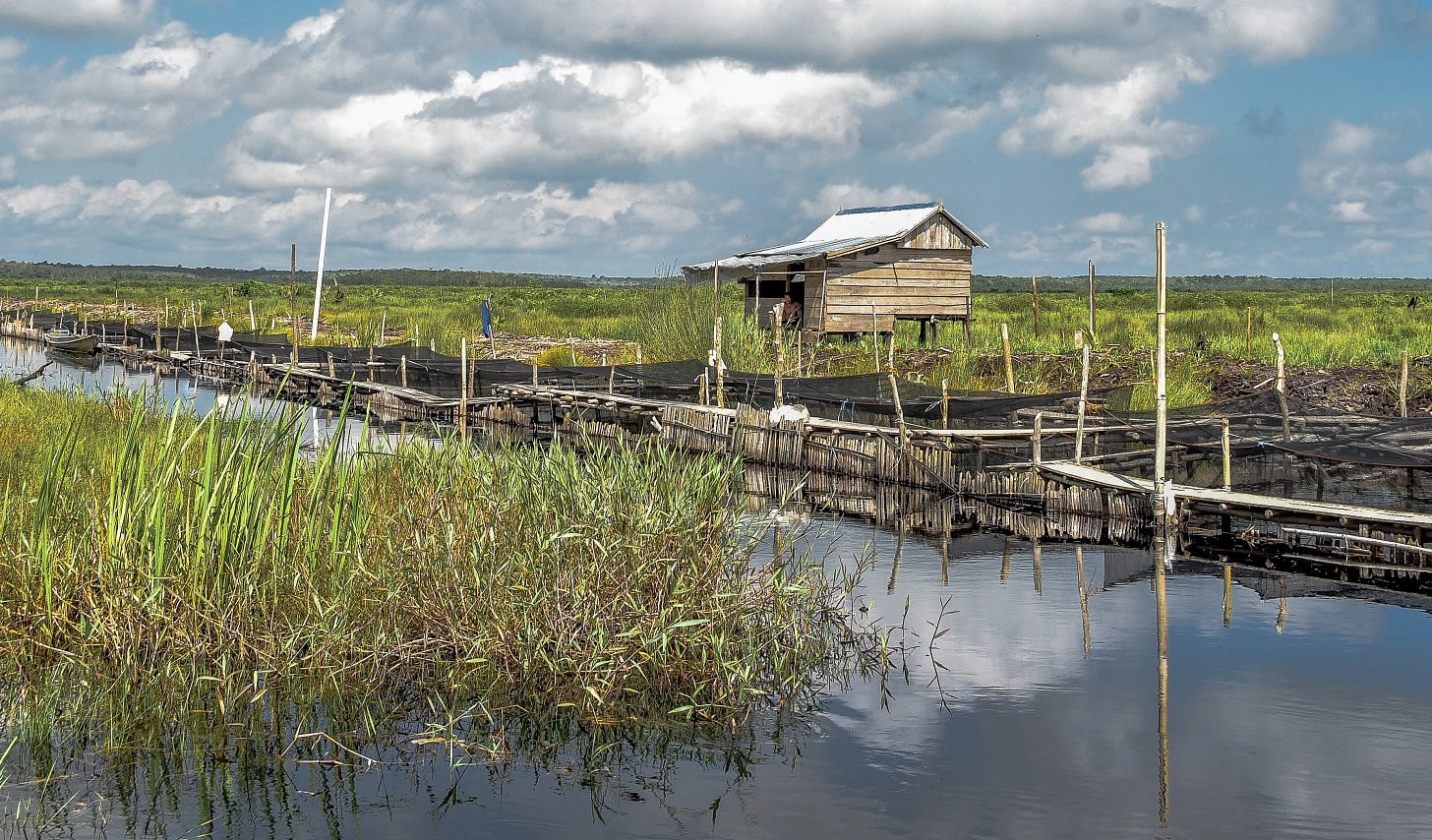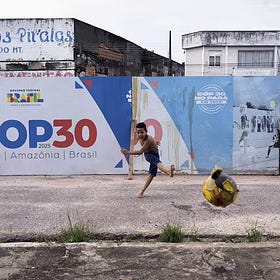Indonesia as a Player in the Global Carbon Trade
But questions about credibility continue to cast a long shadow
By: Ainur Rohmah
Indonesia’s increasingly assertive push to position itself as a global leader in carbon trading has now been on full display at the COP30 climate negotiations in Brazil. Arriving at the talks with more than 60 million tonnes of CO₂-equivalent carbon credits on offer, the country has sought to present itself as one of the world’s largest suppliers of nature-based credits.
While the economic potential of carbon trading is significant and could help support Indonesia’s climate commitments, questions around regulation, transparency, Indigenous rights, and the credibility of its credits continue to cast a long shadow. Critics argue that Indonesia has been too eager to court international buyers before resolving its own governance problems.
Within the sprawling COP30 venue at the edge of the Amazon rainforest, Indonesia carried itself with confidence, presenting itself as a country willing to embrace a high-integrity carbon market ecosystem to attract greater climate-related investment and create new opportunities in the green economy. On opening day, the Indonesia Pavilion hosted a “Sellers Meet Buyers” forum, designed to bring together potential international sellers and buyers of carbon credits.
The government has set an ambitious target of securing US$1 billion in carbon-credit transactions during the summit, offering 44 projects that collectively hold an estimated 90 million tonnes of potential credits from both nature-based and technology-driven initiatives.
“COP30 is our moment to demonstrate that high-integrity carbon credits deliver dual value — reducing emissions while growing the economy,” said Indonesia’s Environment Minister, Hanif Faisol Nurofiq.
President Prabowo Subianto’s Special Envoy for Climate Change and Energy, Hashim Djojohadikusumo, reaffirmed Indonesia’s vision of becoming a global hub for high-integrity carbon markets. Such a market, he argued, should not only deliver meaningful climate impact but also generate jobs, expand community welfare, and strengthen social and ecological resilience. The government has projected that carbon trading could reach US$7.7 billion annually, promising that each tonne of emissions would be traceable, verified, and accountable.
Yet analysts say the government’s US$7.7 billion projection is overly optimistic. Indonesia’s credibility in the carbon market remains limited so long as forest fires and peatland degradation persist, resulting in average annual primary deforestation of 360,000 hectares.
Environmental groups also point to the absence of a firm government commitment to halt forest clearing. “If Indonesia fails to deliver real emissions reductions, particularly in the forest and land-use (FoLU) sector, then the carbon the government is promoting could end up being worth nothing,” said Iqbal Damanik, Climate and Energy Campaign Manager at Greenpeace Indonesia.
To reassure investors, the government has issued a presidential regulation aimed at creating a strong, transparent, and internationally aligned carbon-market ecosystem. The regulation seeks to ensure credible emissions-reduction measurement, making Indonesian carbon assets more attractive to investors while promising tangible social and environmental benefits.
Environmental groups warn that the heavy emphasis on large-scale carbon trading risks becoming a sophisticated form of greenwashing, a way to commodify forests and land without addressing ongoing emissions. Rayhan Dudayev, head of political strategy for Greenpeace’s Global Forest Solutions campaign, criticized Indonesia for chasing what he described as “short-term false solutions” instead of focusing on securing fair climate finance at the COP30 negotiating table.
Carbon markets, Dudayev argued, are not climate finance, a responsibility that should fall squarely on developed countries that are obliged to provide funding while reducing their emissions. Carbon credits, he added, allow major polluters to continue operating while the climate crisis deepens, with consequences felt worldwide, including across Indonesia.
Carbon-market expansion also carries the risk of exacerbating longstanding conflicts between Indigenous communities and forest-concession holders. “The government must listen to Indigenous peoples who are raising their voices loudly here at COP30,” Dudayev said, urging the passage of the long-deliberated Indigenous Peoples Bill as a prerequisite to protecting their rights.
The Controversy of Carbon Trading
Carbon trading, once a niche mechanism in global climate diplomacy, has grown into a multibillion-dollar marketplace where countries and corporations buy and sell the right to emit greenhouse gases. The system is built on a simple premise: pollution has a price. Those who emit must pay, while those who preserve forests or invest in clean technologies can generate credits that others may purchase. In principle, the model is intended to reward climate-friendly behavior and nudge the world toward a lower-carbon future. In practice, it is a complex ecosystem of national rules, voluntary initiatives, and private brokers, all operating with varying degrees of transparency and oversight.
Supporters say carbon markets provide developing nations with a rare opportunity to monetize their natural assets — especially intact forests — while attracting investments that otherwise might bypass them. Critics counter that the system often conceals ongoing pollution, enables corporations to outsource responsibility, and permits questionable claims about conservation or emissions reductions. The market’s legitimacy depends on rigorous verification and honest accounting, both of which remain inconsistent from one region to another.
Still, despite its flaws, carbon trading continues to expand, driven by global pressure to curb warming and the belief that with the right safeguards, financial incentives can help protect the planet rather than accelerate its decline.
Greenpeace Indonesia’s Iqbal Damanik said the country’s carbon-trading push amounts to greenwashing and won’t solve the climate crisis, because it still gives polluters the right to emit. Carbon trading, he argued, won’t lead to meaningful emissions cuts without a serious commitment to move away from fossil fuels.
Based on Indonesian Forum for the Environment (WALHI) data, across Indonesia, carbon concessions have already displaced Indigenous and local communities from their territories. For example, a carbon project in Jambi forced out the Anak Dalam tribe, and an upcoming project in Melawi, West Kalimantan, could displace Indigenous peoples and expose them to criminalization, with 13,000 hectares of Indigenous land to be included in that project. Other initiatives — including REDD and REDD+ — have similarly encroached on customary lands, such as the Kalimantan Forest Climate Partnership (KFCP) in Central Kalimantan, a collaboration between the Indonesian and Australian governments.
Unresolved Domestic Challenges
Several civil society organizations contend that Indonesia is not yet ready to sell carbon credits under Article 6 of the Paris Agreement. Nadia Hadad, Executive Director of Madani Berkelanjutan, emphasized that the government must ensure it meets its own national emissions-reduction targets — its Nationally Determined Contributions (NDCs) — before selling credits abroad. “If the national targets are not met, selling carbon credits internationally could actually cost us the opportunity to reduce our own emissions,” she said.
Hadad cited Indonesia’s First Biennial Transparency Report (2024), released on May 6, 2025, which shows that Indonesia’s emissions in 2019 remained above the required reduction trajectory (Countermeasure 1). Emissions temporarily aligned with national targets in 2020, during the COVID-19 pandemic (Countermeasure 2), but rose again afterward. “The data makes clear that we are not yet fully on track toward meeting our emissions-reduction goals,” she added.
High-quality carbon credits, Hadad said, must meet strict criteria: additionality, permanence, verifiability, no double counting, no leakage, and full transparency and accountability. “Ensuring compliance with all these criteria is not simple,” she said. “It takes time, complex processes, and rigorous oversight.”
Greenpeace’s Damanik echoed these concerns, noting that Indonesia’s push for a carbon market is at odds with persistent domestic issues around Free, Prior and Informed Consent (FPIC), Indigenous land rights, deforestation, and fossil-fuel dependence.
Structural inequalities between buyer and seller countries also present a challenge. Developed nations possess greater technical capacity and stronger bargaining power, while developing countries like Indonesia often operate from weaker negotiating positions. This dynamic can lead to a “race to the bottom,” in which countries compete by offering the lowest carbon prices, potentially at the expense of social and environmental safeguards.
The absence of legal protections for Indigenous rights compounds the risks. Indonesia’s long-awaited Indigenous Peoples Bill remains stalled, even as carbon projects increasingly overlap with traditionally managed Indigenous territories.
Selling carbon before meeting national climate targets, critics warn, is a premature move that risks weakening global climate justice. Instead, they argue, Indonesia should strengthen its climate commitments to align with the 1.5°C pathway, accelerate its shift to clean energy, halt deforestation, and ensure the rights of Indigenous and local communities are fully protected.
See related story:
COP30 in Belem: Mixed Bag for Asia
Fierce fights over fossil fuels and uneven progress on climate finance leave Asia facing uncertainty after a contentious COP30.


